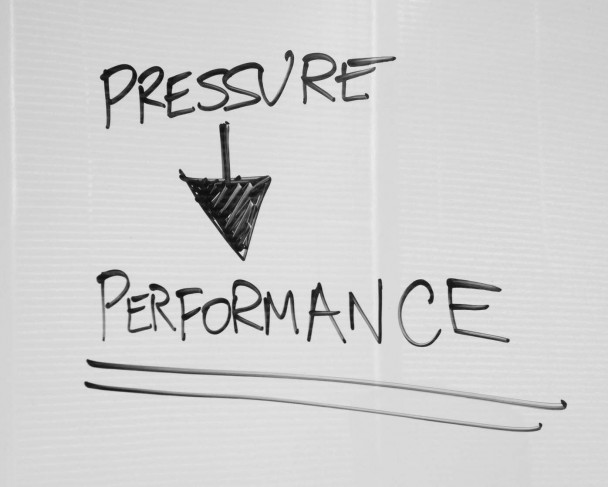
Stress is Linked to High Performance Author Dr John Eliot, has extensively studied top athletes and business people. His research shows that performance anxiety is a very natural and important part of overachievement. In his book, Overachievement, he notes that “the physical symptoms of fight or flight are what the human body has learned over thousands of years to operate efficiently and at the highest level…anxiety is a cognitive interpretation of that physical response.” Simply put, we need performance anxiety to have an opportunity to achieve at our highest level.
The best players in any high-stakes field – business, entertainment, law, surgery, as well as sport – recognize that pressure occurs at the moments when meaningful accomplishment is possible. In fact, that is the reason why performers perform: for the opportunity to tackle challenges head on, to do something significant, to demonstrate what their hard work and talent can produce. ~ John Eliot
A Double Edged Sword The problem with having a brain is that it tends to do a lot of thinking which can get in the way of not only performance, but even performing the most simple of tasks when required. As reported in the University of Chicago Magazine, “during the relaxed execution of a practiced skill, communication between the motor and reasoning areas of the brain decreases. A beginner’s brain, on the other hand, is abuzz with motor and reasoning cross talk, trying to translate newfound knowledge into action. When anxiety increases, experts can start to think like novices, and their performances suffer.” This is probably not news to former baseball player, Bill Buckner, who committed one of the most infamous chokes when he misplayed a routine ground ball while playing for the Red Sox during the 1986 world series.
Tapping into the Subconscious Research conducted by Sian Beilock, a Psychology Professor at the University of Chicago, and author of Choke: What the Secrets of the Brain Reveal About Getting It Right When You Have To, indicated that athletes performed better when they were given tools that enabled them to stop analysing their acrtivities and trying to control their performance. Her team found that even something as simple as whistling can avoid the analysis paralysis that stands in the way of great performance…which reminds me of that scene in the movie Bull Durham where Crash, a veteran minor league baseball player, played by Kevin Costner, is coaching a rookie, Nuke, played by a young tim Robbins. Crash tells Nuke that in order to pitch well, “don’t think; it can only hurt the ball club.” Dr. Eliot’s research also indicated that while all high achievers are innately confident, it is not so much winning that creates the winning attitude, but the process of becoming a winner.
We tend to view confidence as a product of accomplishment rather than part of the process that leads there.
Preparation In fact, in all pursuits, whether it be sports, business, music and particularly the military, practice plays the important role of conditioning the the body to stress and creating familiarity with the situations that typically cause the body to feel anxiety. Athletes train and play sequences of events in their heads to visualize desired outcomes, while military personnel practice with live ammunition to get as used to battle conditions as is possible. In all cases, training is a big part of performance and ideally we are so familiar with an activity, we are able to operate outside our conscious awareness – like pedalling a bike. The more familiar something is the less likely we are to feel. I know from my own experiences and being involved in negotiations on a daily basis, what used to make me nervous, say walking into a room full of A-type executives, now hardly raises my blood pressure at all and I sometimes find myself coming up with ways to make meetings more exciting to create the uncertainty that gets me excited.
Public speaking, which I do often, but not as often as I am involved in business negotiations, is another personal example of dealing with stress. Obviously repetition breeds comfort and I have done a lot of speeches, but when I step up to the podium to begin a speech in front of a large audience, like most people who speak in public, I experience a sense of pressure from wanting to deliver a great presentation and make a positive impression – even if I have prepared well in advance. To use this to my advantage, I have a little routine that helps me achieve my goals and prevents the situation from controlling me. First, at the outset, I anticipate my anxiety coming on and when it does, I smile because after giving many speeches my nerves are as familiar to me as an old friend. To a large extent I stay focussed on what I am doing, how I am going to do the things I have practiced and give the performance I have prepared to give, but I also try to drink in the energy in the room and I want that nervous feeling because its a valuable tool for getting all my juices flowing and starting my speech with a bang. It excites me. Plus I know from experience how quickly nervousness subsides once I get rolling, so I can consciously ride the wave until I hit my groove.
Make Pressure Work to Drive Sales Whether it be cold calls, or important negotiations, there are many situations where sales reps, even the best ones, will feel pressure and performance anxieties. There are many ways we can prepare for these situations to improve outcomes.
- Role Plays – Practicing activities such as cold calling or negotiating can help people get more familiar with situations that would otherwise be unfamiliar and stressful. Going through the activities over and over can help.
- Repetition – One of the best ways to get over cold calling anxiety is to schedule time to do a while of them back to back. For me personally, I always found the first few cold calls on any given day were tough, but after a few calls, I warmed up, found a rhythm and was able to react effortlessly to all questions and objections that were thrown at me.
- Scripts – Writing down meaningful responses to likely questions from prospects in advance of sales calls helps a sales rep visualize doing the right things when they have to which, aids in actually doing the right things when required. More importantly, it can help the right spend more time thinking about what to say, over stressing about saying the wrong thing.
- Meditation – Beilock’s research showed that relaxation techniques such as singing or meditation, even in small amounts, allow people to separate themselves from over analysis, which in turn results in higher performance on high stakes tests.
- Positive Thinking – If we think of all experiences as positive in that we always are learning and always building a foundation for future success, then there really is no way to fail. And if there is no way to fail, then there is less chance of analysis paralysis. Just act and trust that things will ultimately turn out well.
- Keeping Things in Perspective – Unlike armed forces personnel, we in sales are not in life threatening situations, nor are we performing life saving duties like a doctor. Often we are not even in life changing situations. We need to keep in mind that the worst case scenario is often not as bad as we think it might be.
High performers experience pressure, which is both natural and necessary for high achievement, and the highest sales performers know the importance of embrace that pressure to win. But all sales reps can benefit from learning to manage stress and if a sales leader not only promotes these stress mitigation practices, but also demonstrates them in their own behaviour there is a high chance that the sales reps will also adopt them and experience better performance – which is great for overall sales force performance and numbers. To your success! References: Overachievement – the New Model for Exceptional Performance University of Chicago Magazine – Performance Anxiety Choke: What the Secrets of the Brain Reveal About Getting It Right When You Have To
relpost-thumb-wrapper
close relpost-thumb-wrapper
Eliot Burdett
Eliot received his B. Comm. from Carleton University and has been honored as a Top 40 Under 40 Award winner.
He co-authored Sales Recruiting 2.0, How to Find Top Performing Sales People, Fast and provides regular insights on sales team management and hiring on the Peak Sales Recruiting Blog.
Latest posts by Eliot Burdett (see all)
- 20 Of Our Favorite Books About Sales Management and Sales Leadership – October 20, 2023
- How To Make Progress On Your Sales Goal Without A Sales Leader – September 15, 2021
- Augment Your Recruiting Strategy During “The Great Resignation” – July 26, 2021




